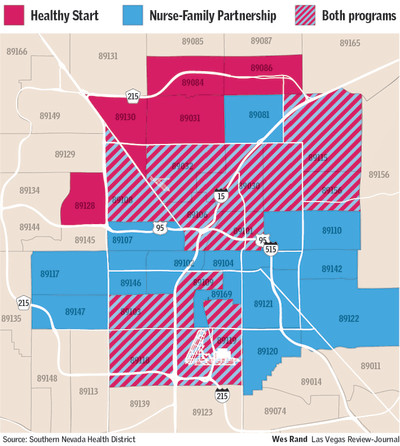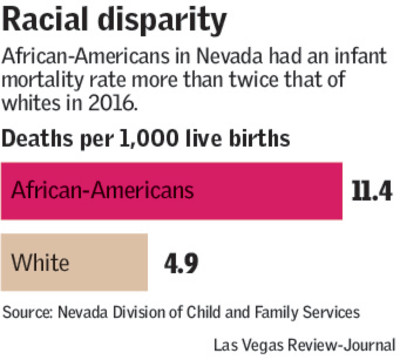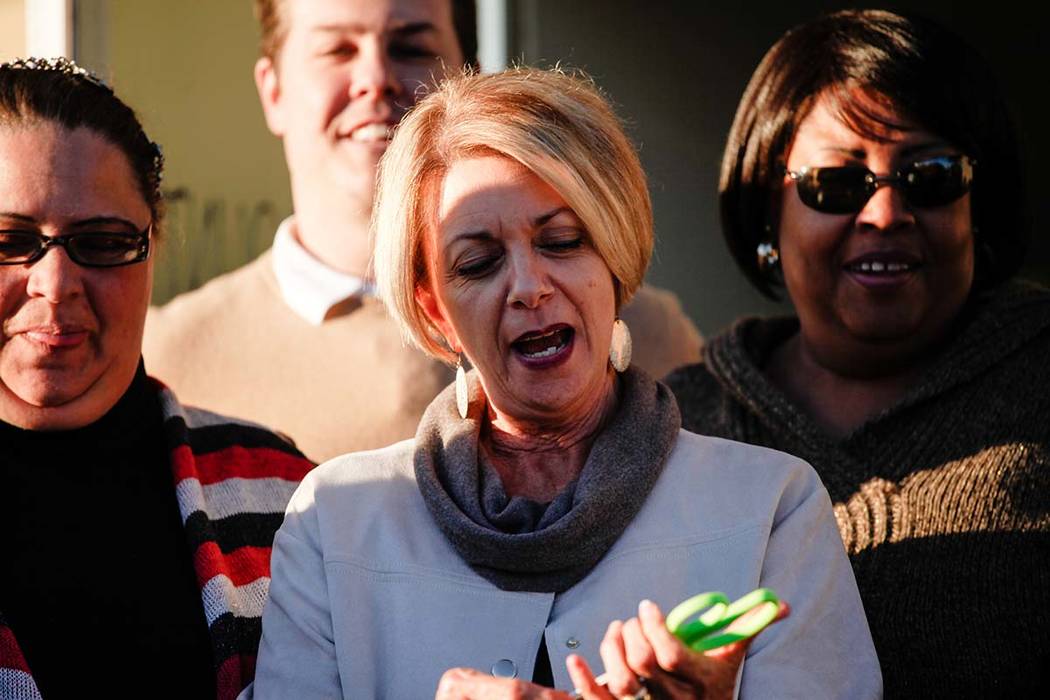Loss of grant shuts program to cut Clark County infant mortality
The Southern Nevada Health District has ended a maternal health program aimed at reducing deaths among African-American infants in Clark County.
The Healthy Start program’s federal grant funding ended March 31 and was not renewed. There were 140 women, and their children, enrolled in the program, most of whom the health district was not able to absorb into its other maternal health programs.
“It’s a disaster for these families,” said Kim Amato, vice chair of the Southern Nevada Maternal Child Health Coalition. “There’s no other program like it. This one is devoted specifically to women of color.”
The closure comes as the state of Nevada seeks to better track pregnancy-related deaths. Gov. Steve Sisolak signed legislation this month to create a statewide Maternal Mortality Review Committee.
The local Healthy Start program provided support for women before and during pregnancy and up to two years after childbirth. It targeted high-risk communities in Las Vegas and North Las Vegas.
Served 450 clients in 2018
The program launched in 2014 and served about 450 clients last year. More than half served were African-American women, who die of pregnancy-related causes at a rate greater than any other racial group in the U.S.
Fighting pregnancy-related deaths
The Southern Nevada Health District discontinued its Healthy Start program, which focused on reducing infant mortality rates in high-risk communities in Las Vegas and North Las Vegas. The similar Nurse-Family Partnership program remains active.

Additionally, African-Americans have the highest rates of infant mortality and pre-term birth in Clark County, Healthy Start project director Margarita DeSantos said.
To help turn the tide, Healthy Start nurses would regularly visit participants at their homes and educate them on prenatal nutrition, child care and other topics. The nurses also helped families get health insurance, find a primary care physician and connect them with nonprofits that could provide cribs, car seats and other necessities for free.
“Anything and everything an OB-GYN would talk about, they would talk about,” Amato said of the nurses. “Healthy Start played a big role in not only helping these families but also letting them know this community cares.”
DeSantos said Healthy Start had not been active in Clark County long enough to measure its effectiveness, but there were no infant or maternal deaths among any of the clients during the course of the program.
Torriona Nubine, a 26-year-old African-American woman, enrolled earlier this year when she was six months pregnant with her second child. A nurse taught her she could make her breast milk healthier by not drinking sugary beverages or eating red meat.

“I met with the same woman every single time. Her demeanor was welcoming, kind and caring,” Nubine said. “Especially in the African-American community, a lot of younger women are becoming mothers, and to have a program like this to go to for guidance, help and support is the best thing that could come to the community.”
Healthy Start cost approximately $645,000 a year. A U.S. Department of Health and Human Services grant funded more than 90 percent of the costs, and the rest was paid for by the health district.
The health district found out in late March it did not receive another five-year grant for the program. The same grant won’t be available again until 2024.
Searching for alternatives
A report from the committee that reviewed the health district’s application cited only one weakness with the submission: that it did not contain all the required information for a proposed quality improvement plan. DeSantos said she had “absolutely no idea” why the health district did not receive the funding.
“That was a decision made by a federal agency,” she said. “We prepared the best application we could to submit.”
Scott Nielson, finance committee chair of the health district’s board, told his colleagues at their March 28 meeting that there were funds available for the Healthy Start program in the district’s tentative budget. On Friday, he confirmed that money was still available but said no board members had asked him about continuing Healthy Start.
“There hasn’t been any action taken to find replacement funding for it on behalf of the board,” he said.
For now, the health district is focusing on transferring Healthy Start clients into other maternal health programs it operates, as well as other such programs in the community.
One such program run by the health district is the Nurse-Family Partnership, which only accepts women in their first pregnancy. The other is the generalized Maternal Child Health Program, which is staffed by only one nurse.
But about 120 of the 140 women enrolled in Healthy Start were not eligible for the health district’s other programs.
Spokeswoman Jennifer Sizemore said all those clients were told about a similar program run by the Sunrise Children’s Foundation, but the vast majority were not interested in transferring.
Sunrise Children’s Foundation Executive Director David Sanberg said on Friday that his organization had yet to hear from any families. He said the organization was ready to welcome as many new clients as it could, but its program was nearing capacity.
“If I stretch it I could take another 20 families,” he said.
Contact Michael Scott Davidson at sdavidson@reviewjournal.com or 702-477-3861. Follow @davidsonlvrj on Twitter.























